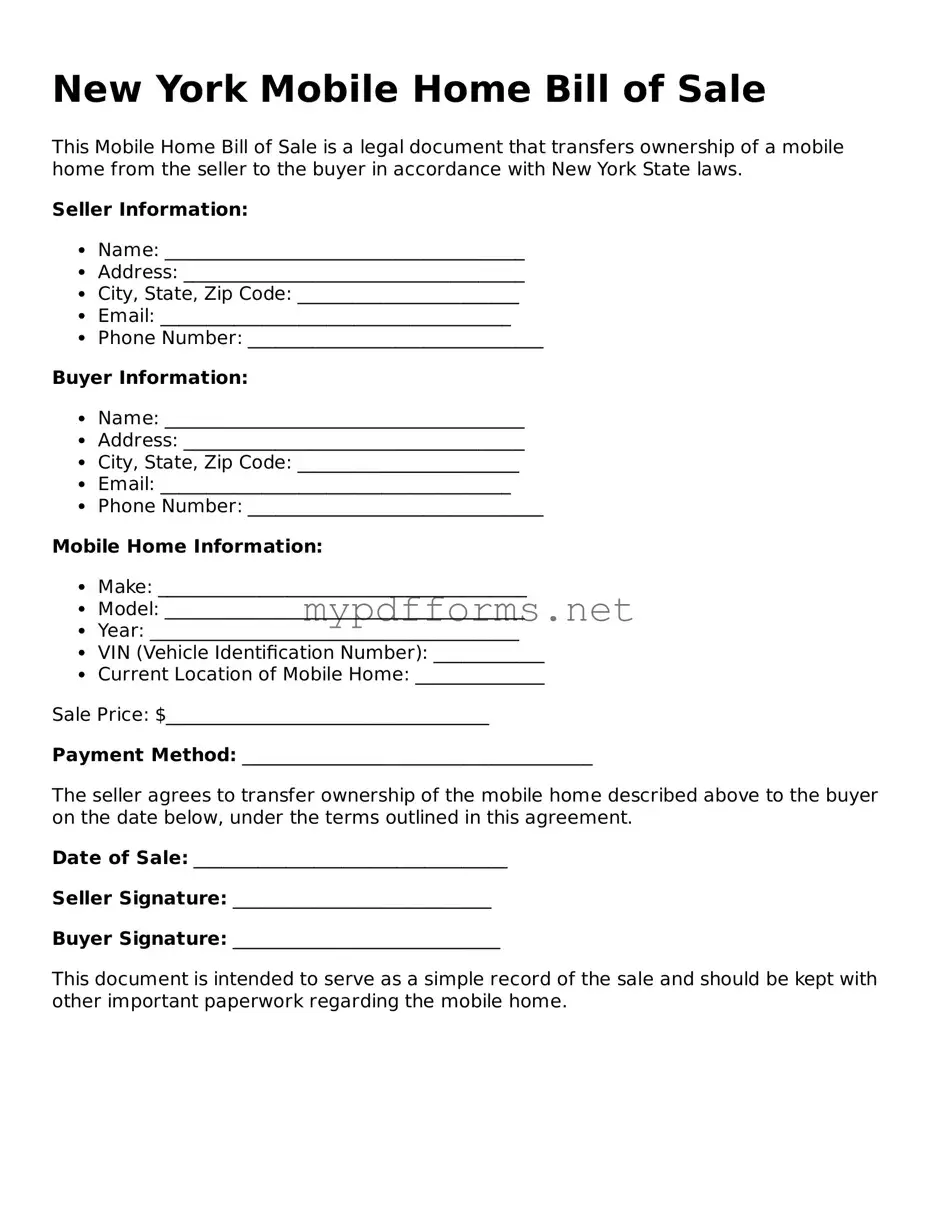The New York Vehicle Bill of Sale is a document that serves a similar purpose to the Mobile Home Bill of Sale. It is used to transfer ownership of a motor vehicle from one party to another. Just like the Mobile Home Bill of Sale, it includes essential details such as the buyer and seller's names, vehicle identification number, and the sale price. Both documents protect the interests of the parties involved by providing a written record of the transaction.
The Boat Bill of Sale is another document that bears similarities to the Mobile Home Bill of Sale. This form is utilized when ownership of a boat is transferred. It contains information about the boat, such as its make, model, and hull identification number. Like the Mobile Home Bill of Sale, it serves as proof of the transaction and helps to establish legal ownership, which can be crucial for registration and insurance purposes.
A Motorcycle Bill of Sale also shares characteristics with the Mobile Home Bill of Sale. This document is specifically designed for the sale of motorcycles. It captures vital details such as the motorcycle's VIN, the sale price, and the names of both the buyer and seller. By providing a clear record of the sale, it helps prevent disputes and ensures that both parties have a mutual understanding of the transaction.
The Trailer Bill of Sale is similar in function to the Mobile Home Bill of Sale, as it facilitates the transfer of ownership of a trailer. This document includes information about the trailer, including its make, model, and identification number. It serves as a formal agreement between the buyer and seller, providing legal protection and clarity regarding the sale.
The RV Bill of Sale is another related document that is used when selling a recreational vehicle. Like the Mobile Home Bill of Sale, it includes details about the RV, such as its make, model, and VIN. This document is important for both parties, as it provides proof of ownership transfer and can be essential for registration and financing purposes.
The Farm Equipment Bill of Sale is similar in that it documents the sale of agricultural machinery. It captures details about the equipment, including its make, model, and condition. Much like the Mobile Home Bill of Sale, this document serves to protect both the buyer and seller by providing a written record of the transaction and ensuring that both parties understand the terms of the sale.
The Personal Property Bill of Sale is a broader document that can be used for various types of personal property transactions, including mobile homes. This form typically outlines the details of the item being sold, the sale price, and the parties involved. It serves a similar purpose as the Mobile Home Bill of Sale by providing a clear record of ownership transfer and protecting the rights of both the buyer and seller.
The Lease Agreement can also be considered similar in certain contexts, particularly when a mobile home is rented rather than sold. This document outlines the terms of the rental arrangement, including payment details and responsibilities of both parties. While it does not transfer ownership, it is essential for establishing the rights and obligations of those involved in the transaction.
The Affidavit of Title is another document that parallels the Mobile Home Bill of Sale. This form is often used when the seller cannot provide a traditional title for the property being sold. It serves to affirm the seller's ownership and the legitimacy of the sale. Both documents aim to ensure that the transaction is valid and that the buyer receives clear ownership rights.
When it comes to formally documenting transactions, the California Dog Bill of Sale form is essential for new dog owners. This comprehensive document not only ensures a smooth transfer of ownership but also records vital information about the dog, protecting the rights of both seller and buyer. For those unfamiliar with this process, utilizing resources like Top Document Templates can simplify the creation of this important document, making it easier to navigate the responsibilities involved in pet ownership.
Finally, the Warranty Deed is a legal document that transfers ownership of real property, including mobile homes situated on land. While it is more formal and typically used in real estate transactions, it serves a similar purpose by providing a written record of ownership transfer. Both the Warranty Deed and the Mobile Home Bill of Sale aim to protect the interests of the parties involved and ensure clarity in ownership rights.

